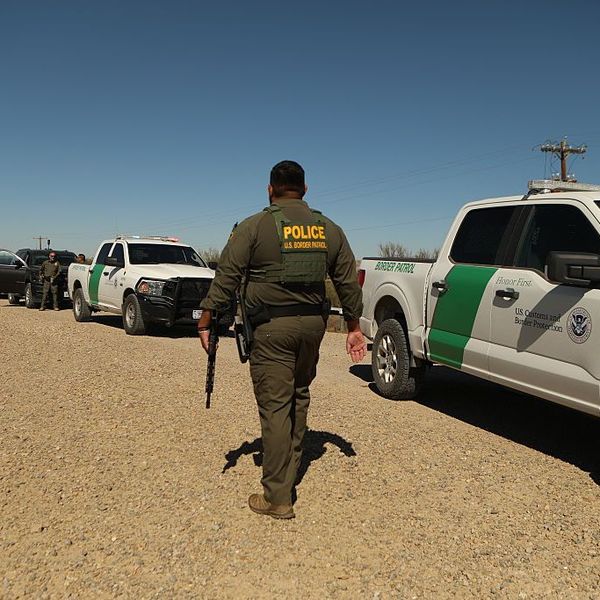
"Two other federal appellate opinions this year--from the Fifth Circuit and Eleventh Circuit--included strong analyses by judges who similarly questioned suspicionless border device searches." (Photo: qbac07/Flickr/cc)
Fourth Circuit Rules That Suspicionless Forensic Searches of Electronic Devices at the Border Are Unconstitutional
EFF has long argued that border agents need a warrant from a judge, based on probable cause of criminality, to conduct electronic device searches of any kind.
The ruling in U.S. v. Kolsuz is the first federal appellate case after the Supreme Court's seminal decision in Riley v. California (2014)to hold that certain border device searches require individualized suspicion that the traveler is involved in criminal wrongdoing. Two other federal appellate opinions this year--from the Fifth Circuit and Eleventh Circuit--included strong analyses by judges who similarly questioned suspicionless border device searches.
EFF filed an amicus brief in Kolsuz arguing that the Supreme Court's decision in Riley supports the conclusion that border agents need a probable cause warrant before searching electronic devices--whether manually or with forensic software--because of the unprecedented and significant privacy interests travelers have in their digital data. In Riley, a case that involved manual searches, the Supreme Court followed similar reasoning and held that police must obtain a warrant to search the cell phone of an arrestee.
As Hamza Kolsuz prepared to board a flight to Turkey at Washington Dulles International Airport, border agents searched his luggage and found that he was attempting to export firearms parts without a U.S. license. Border agents then confiscated his iPhone and manually searched it. They subsequently arrested Kolsuz and conducted a second search of his iPhone, this time using a forensic tool by the company Cellebrite. This forensic search produced "an 896-page report that included Kolsuz's personal contact lists, emails, messenger conversations, photographs, videos, calendar, web browsing history, and call logs, along with a history of Kolsuz's physical location down to precise GPS coordinates," according to the court's opinion.
The Fourth Circuit's ruling applies only to forensic, not manual, searches of electronic devices at the border because Kolsuz only challenged the use of the evidence obtained from the forensic search of his cell phone in his prosecution. "We have no occasion here to consider whether Riley calls into question the permissibility of suspicionless manual searches of digital devices at the border," the court said.
While we're heartened that the Fourth Circuit left open the possibility that manual searches may also require individualized suspicion, we disagree with the court's unsupported statement that "the distinction between manual and forensic searches is a perfectly manageable one," given that manual searches of electronic devices enable government agents to access virtually the same personal information as forensic searches.
EFF has long argued that border agents need a warrant from a judge, based on probable cause of criminality, to conduct electronic device searches of any kind. The Supreme Court's pre-Riley case law, however, permits warrantless and suspicionless "routine" searches of items like luggage that travelers carry across the border, a rule known as the border search exception to the Fourth Amendment's warrant requirement. Based on these pre-Riley cases, the government claims it has the power to search and confiscate travelers' cell phones, tablets, and laptops at airports and border crossings for no reason or any reason, and without judicial oversight.
The Kolsuz court recognized the unique privacy interests that travelers have in their digital data and thus held, "particularly in light of the Supreme Court's decision in Riley," that forensic border device searches are "non-routine" searches that require "some form of individualized suspicion." The Fourth Circuit quoted Supreme Court precedent and concluded that forensic border device searches are "highly intrusive" searches that infringe the "dignity and privacy interests" of individuals. The court noted, "The key to Riley's reasoning is its express refusal to treat [cell] phones as just another form of container...."
Importantly, the Fourth Circuit also left open the possibility that forensic border device searches may require the highest standard of individualized suspicion under the Fourth Amendment: "What precisely that standard should be--whether reasonable suspicion is enough... or whether there must be a warrant based on probable cause... is a question we need not resolve."
Unfortunately for Kolsuz, the Fourth Circuit did not suppress the 896-page report that resulted from the warrantless forensic search of his cell phone. The court held that the border agents reasonably relied upon existing case law "allowing warrantless border searches of digital devices that are based on at least reasonable suspicion," and that the firearms parts that were found in his luggage supported reasonable suspicion that his cell phone contained evidence that Kolsuz was involved in "ongoing efforts to export contraband illegally."
While we would have liked to see the Fourth Circuit go further by expressly requiring a warrant for all border device searches, we're optimistic that we can win such a ruling in our civil case with ACLU against the U.S. Department of Homeland Security, Alasaad v. Nielsen, challenging warrantless border searches of electronic devices.
An Urgent Message From Our Co-Founder
Dear Common Dreams reader, The U.S. is on a fast track to authoritarianism like nothing I've ever seen. Meanwhile, corporate news outlets are utterly capitulating to Trump, twisting their coverage to avoid drawing his ire while lining up to stuff cash in his pockets. That's why I believe that Common Dreams is doing the best and most consequential reporting that we've ever done. Our small but mighty team is a progressive reporting powerhouse, covering the news every day that the corporate media never will. Our mission has always been simple: To inform. To inspire. And to ignite change for the common good. Now here's the key piece that I want all our readers to understand: None of this would be possible without your financial support. That's not just some fundraising cliche. It's the absolute and literal truth. We don't accept corporate advertising and never will. We don't have a paywall because we don't think people should be blocked from critical news based on their ability to pay. Everything we do is funded by the donations of readers like you. Will you donate now to help power the nonprofit, independent reporting of Common Dreams? Thank you for being a vital member of our community. Together, we can keep independent journalism alive when it’s needed most. - Craig Brown, Co-founder |
The ruling in U.S. v. Kolsuz is the first federal appellate case after the Supreme Court's seminal decision in Riley v. California (2014)to hold that certain border device searches require individualized suspicion that the traveler is involved in criminal wrongdoing. Two other federal appellate opinions this year--from the Fifth Circuit and Eleventh Circuit--included strong analyses by judges who similarly questioned suspicionless border device searches.
EFF filed an amicus brief in Kolsuz arguing that the Supreme Court's decision in Riley supports the conclusion that border agents need a probable cause warrant before searching electronic devices--whether manually or with forensic software--because of the unprecedented and significant privacy interests travelers have in their digital data. In Riley, a case that involved manual searches, the Supreme Court followed similar reasoning and held that police must obtain a warrant to search the cell phone of an arrestee.
As Hamza Kolsuz prepared to board a flight to Turkey at Washington Dulles International Airport, border agents searched his luggage and found that he was attempting to export firearms parts without a U.S. license. Border agents then confiscated his iPhone and manually searched it. They subsequently arrested Kolsuz and conducted a second search of his iPhone, this time using a forensic tool by the company Cellebrite. This forensic search produced "an 896-page report that included Kolsuz's personal contact lists, emails, messenger conversations, photographs, videos, calendar, web browsing history, and call logs, along with a history of Kolsuz's physical location down to precise GPS coordinates," according to the court's opinion.
The Fourth Circuit's ruling applies only to forensic, not manual, searches of electronic devices at the border because Kolsuz only challenged the use of the evidence obtained from the forensic search of his cell phone in his prosecution. "We have no occasion here to consider whether Riley calls into question the permissibility of suspicionless manual searches of digital devices at the border," the court said.
While we're heartened that the Fourth Circuit left open the possibility that manual searches may also require individualized suspicion, we disagree with the court's unsupported statement that "the distinction between manual and forensic searches is a perfectly manageable one," given that manual searches of electronic devices enable government agents to access virtually the same personal information as forensic searches.
EFF has long argued that border agents need a warrant from a judge, based on probable cause of criminality, to conduct electronic device searches of any kind. The Supreme Court's pre-Riley case law, however, permits warrantless and suspicionless "routine" searches of items like luggage that travelers carry across the border, a rule known as the border search exception to the Fourth Amendment's warrant requirement. Based on these pre-Riley cases, the government claims it has the power to search and confiscate travelers' cell phones, tablets, and laptops at airports and border crossings for no reason or any reason, and without judicial oversight.
The Kolsuz court recognized the unique privacy interests that travelers have in their digital data and thus held, "particularly in light of the Supreme Court's decision in Riley," that forensic border device searches are "non-routine" searches that require "some form of individualized suspicion." The Fourth Circuit quoted Supreme Court precedent and concluded that forensic border device searches are "highly intrusive" searches that infringe the "dignity and privacy interests" of individuals. The court noted, "The key to Riley's reasoning is its express refusal to treat [cell] phones as just another form of container...."
Importantly, the Fourth Circuit also left open the possibility that forensic border device searches may require the highest standard of individualized suspicion under the Fourth Amendment: "What precisely that standard should be--whether reasonable suspicion is enough... or whether there must be a warrant based on probable cause... is a question we need not resolve."
Unfortunately for Kolsuz, the Fourth Circuit did not suppress the 896-page report that resulted from the warrantless forensic search of his cell phone. The court held that the border agents reasonably relied upon existing case law "allowing warrantless border searches of digital devices that are based on at least reasonable suspicion," and that the firearms parts that were found in his luggage supported reasonable suspicion that his cell phone contained evidence that Kolsuz was involved in "ongoing efforts to export contraband illegally."
While we would have liked to see the Fourth Circuit go further by expressly requiring a warrant for all border device searches, we're optimistic that we can win such a ruling in our civil case with ACLU against the U.S. Department of Homeland Security, Alasaad v. Nielsen, challenging warrantless border searches of electronic devices.
The ruling in U.S. v. Kolsuz is the first federal appellate case after the Supreme Court's seminal decision in Riley v. California (2014)to hold that certain border device searches require individualized suspicion that the traveler is involved in criminal wrongdoing. Two other federal appellate opinions this year--from the Fifth Circuit and Eleventh Circuit--included strong analyses by judges who similarly questioned suspicionless border device searches.
EFF filed an amicus brief in Kolsuz arguing that the Supreme Court's decision in Riley supports the conclusion that border agents need a probable cause warrant before searching electronic devices--whether manually or with forensic software--because of the unprecedented and significant privacy interests travelers have in their digital data. In Riley, a case that involved manual searches, the Supreme Court followed similar reasoning and held that police must obtain a warrant to search the cell phone of an arrestee.
As Hamza Kolsuz prepared to board a flight to Turkey at Washington Dulles International Airport, border agents searched his luggage and found that he was attempting to export firearms parts without a U.S. license. Border agents then confiscated his iPhone and manually searched it. They subsequently arrested Kolsuz and conducted a second search of his iPhone, this time using a forensic tool by the company Cellebrite. This forensic search produced "an 896-page report that included Kolsuz's personal contact lists, emails, messenger conversations, photographs, videos, calendar, web browsing history, and call logs, along with a history of Kolsuz's physical location down to precise GPS coordinates," according to the court's opinion.
The Fourth Circuit's ruling applies only to forensic, not manual, searches of electronic devices at the border because Kolsuz only challenged the use of the evidence obtained from the forensic search of his cell phone in his prosecution. "We have no occasion here to consider whether Riley calls into question the permissibility of suspicionless manual searches of digital devices at the border," the court said.
While we're heartened that the Fourth Circuit left open the possibility that manual searches may also require individualized suspicion, we disagree with the court's unsupported statement that "the distinction between manual and forensic searches is a perfectly manageable one," given that manual searches of electronic devices enable government agents to access virtually the same personal information as forensic searches.
EFF has long argued that border agents need a warrant from a judge, based on probable cause of criminality, to conduct electronic device searches of any kind. The Supreme Court's pre-Riley case law, however, permits warrantless and suspicionless "routine" searches of items like luggage that travelers carry across the border, a rule known as the border search exception to the Fourth Amendment's warrant requirement. Based on these pre-Riley cases, the government claims it has the power to search and confiscate travelers' cell phones, tablets, and laptops at airports and border crossings for no reason or any reason, and without judicial oversight.
The Kolsuz court recognized the unique privacy interests that travelers have in their digital data and thus held, "particularly in light of the Supreme Court's decision in Riley," that forensic border device searches are "non-routine" searches that require "some form of individualized suspicion." The Fourth Circuit quoted Supreme Court precedent and concluded that forensic border device searches are "highly intrusive" searches that infringe the "dignity and privacy interests" of individuals. The court noted, "The key to Riley's reasoning is its express refusal to treat [cell] phones as just another form of container...."
Importantly, the Fourth Circuit also left open the possibility that forensic border device searches may require the highest standard of individualized suspicion under the Fourth Amendment: "What precisely that standard should be--whether reasonable suspicion is enough... or whether there must be a warrant based on probable cause... is a question we need not resolve."
Unfortunately for Kolsuz, the Fourth Circuit did not suppress the 896-page report that resulted from the warrantless forensic search of his cell phone. The court held that the border agents reasonably relied upon existing case law "allowing warrantless border searches of digital devices that are based on at least reasonable suspicion," and that the firearms parts that were found in his luggage supported reasonable suspicion that his cell phone contained evidence that Kolsuz was involved in "ongoing efforts to export contraband illegally."
While we would have liked to see the Fourth Circuit go further by expressly requiring a warrant for all border device searches, we're optimistic that we can win such a ruling in our civil case with ACLU against the U.S. Department of Homeland Security, Alasaad v. Nielsen, challenging warrantless border searches of electronic devices.

